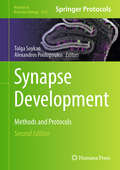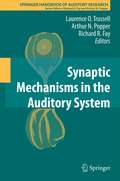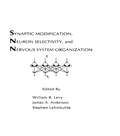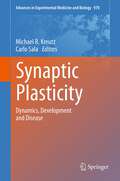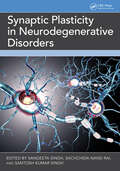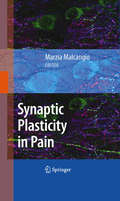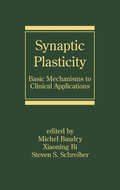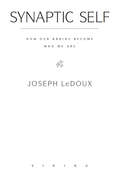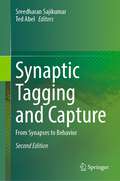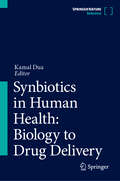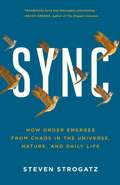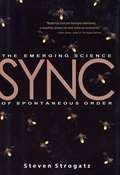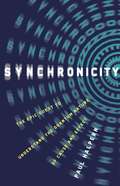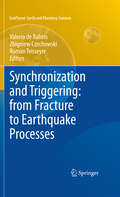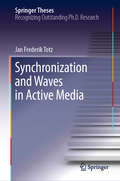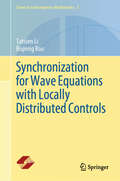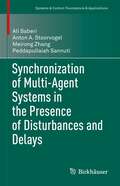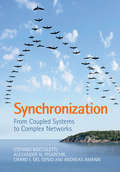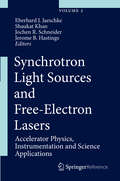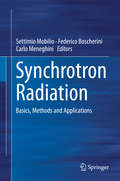- Table View
- List View
Synapse Development: Methods and Protocols (Methods in Molecular Biology #2910)
by Alexandros Poulopoulos Tolga SoykanThis fully updated volume brings together synapse development methods that span from the macroscopic to the nanoscale in order to foster novel perspectives and encourage interdisciplinary integration. Beginning with a section on in vitro formation and manipulation of synapses, including cutting-edge approaches for neuron differentiation and genomic modification, the book continues by covering methods for dissecting synaptic components at high resolution, utilizing advanced imaging and purification techniques, as well as approaches for studying synaptic networks and activity patterns in their native contexts, featuring methods for labeling, tracing, and quantifying components of developing neural circuits. Written for the highly successful Methods in Molecular Biology series, chapters include introductions to their respective topics, lists of the necessary materials and reagents, step-by-step and readily reproducible laboratory protocols, and tips on troubleshooting and avoiding known pitfalls. Authoritative and up-to-date, Synapse Development: Methods and Protocols, Second Edition serves as valuable resource for researchers seeking to advancing our understanding of how synapses form, transform, and transmit.
Synaptic Mechanisms in the Auditory System
by Arthur N. Popper Richard R. Fay Laurence O. TrussellSynaptic Mechanisms in the Auditory System will provide a basic reference for students, clinicians, and researchers on how synapses in the auditory system function to encode acoustic signals. These mechanisms are the groundwork for all auditory processing, and understanding them requires knowledge of the microphysiology of synapses, cellular biophysics, receptor pharmacology, and an appreciation for what these synapses must do for a living, what unique jobs they carry out.
Synaptic Modification, Neuron Selectivity, and Nervous System Organization
by William B. Levy, James A. Anderson and Stephen LehmkuhleFirst published in 1985. Routledge is an imprint of Taylor & Francis, an informa company.
Synaptic Plasticity
by Michael R. Kreutz Carlo SalaThis book introduces the current concepts of molecular mechanisms in synaptic plasticity and provides a comprehensive overview of cutting-edge research technology used to investigate the molecular dynamics of the synapses. It explores current concepts on activity-dependent remodeling of the synaptic cytoskeleton and presents the latest ideas on the different forms of plasticity in synapses and dendrites. Synaptic Plasticity in Health and Disease not only supplies readers with extensive knowledge on the latest developments in research, but also with important information on clinical and applied aspects. Changes in spine synapses in different brain disease states, so-called synaptopathies, are explained and described by experts in the field. By outlining basic research findings as well as physiological and pathophysiological impacts on synaptic plasticity, the book represents an essential state-of-the-art work for scientists in the fields of biochemistry, molecular biology and the neurosciences, as well as for doctors in neurology and psychiatry alike.
Synaptic Plasticity in Neurodegenerative Disorders
by Sangeeta Singh Santosh Kumar Singh Sachchida Nand RaiThis book explores the pivotal role of synaptic plasticity in the pathogenesis, progression, and potential treatment of neurodegenerative disorders. The initial chapter provides an in-depth understanding of the complexity and impact of neurodegenerative conditions. It discusses the association of mitochondrial dysfunction, epigenetic influences, and neuroinflammation with synaptic plasticity in neurodegenerative diseases. The following chapters review the dynamic changes that occur at the cellular and synaptic levels in Parkinson's disease, Alzheimer's disease, and Huntington's disease, paving the way for innovative therapeutic strategies. Furthermore, the book presents various computational tools and methodologies essential for enhancing our understanding of synaptic plasticity. It examines the transformative role of artificial intelligence tools in addressing synaptic impairment across various neurodegenerative diseases. Discusses the role of synaptic plasticity in neurodegenerative diseases, shedding light on how dynamic changes occur at the cellular and synaptic levels Explores the transformative role of artificial intelligence tools in addressing synaptic impairment across various neurodegenerative diseases Provides a comprehensive overview of neurodegenerative disorders, including pathogenesis, etiology, and treatment strategies Presents tools and techniques used to simulate the complex system biology of synaptic plasticity Examines the role of computational neuroscience in understanding and potentially treating conditions such as multiple sclerosis and amyotrophic lateral sclerosis Toward the end, the book explores the role of synaptic impairment and computational neuroscience in understanding and potentially treating conditions such as multiple sclerosis and amyotrophic lateral sclerosis. With its multifaceted approach, this book serves as a useful resource for researchers, clinicians, and students in the fields of neuroscience, computational biology, and neurology.
Synaptic Plasticity in Pain
by Marzia MalcangioPrimary sensory neurons respond to peripheral stimulation and project to the spinal cord. Specifically, the population of neurons which respond to damaging stimuli terminate in the superficial layers of the dorsal horn. Therefore, the dorsal horns constitute the first relay site for nociceptive fibre terminals which make synaptic contacts with second order neurons. It has recently become clear that the strength of this first pain synapse is plastic and modifiable by several modulators, including neuronal and non-neuronal regulators, and studies on the fundamental processes regulating the plasticity of the first pain synapse have resulted in the identification of new targets for the treatment of chronic pain. This book will be of interest to a wide readership in the pain field.
Synaptic Plasticity: Basic Mechanisms to Clinical Applications (Neurological Disease and Therapy)
by Michel Baudry Xiaoning Bi Steven S. SchreiberThis reference provides a clear understanding of the basic mechanisms of synaptic transmission and information processing and illustrates potential clinical applications for the recovery of lost function as a result of gene defects, injury, or disease-relating the most recent advances in the design of new therapeutics, the treatment of neurological
Synaptic Self: How Our Brains Become Who We Are
by Joseph LedouxIn 1996 Joseph LeDoux's The Emotional Brain presented a revelatory examination of the biological bases of our emotions and memories. Now, the world-renowned expert on the brain has produced with a groundbreaking work that tells a more profound story: how the little spaces between the neurons—the brain's synapses—are the channels through which we think, act, imagine, feel, and remember. Synapses encode the essence of personality, enabling each of us to function as a distinctive, integrated individual from moment to moment. Exploring the functioning of memory, the synaptic basis of mental illness and drug addiction, and the mechanism of self-awareness, Synaptic Self is a provocative and mind-expanding work that is destined to become a classic. .
Synaptic Tagging and Capture: From Synapses to Behavior
by Sreedharan Sajikumar Ted AbelThis reference presents a detailed exploration of the synaptic tagging and capture model, which has been proposed to provide a conceptual basis for how short-term memories are transformed into long-term memories. The first edition of Synaptic Tagging and Capture served as a comprehensive introduction and overview of the field and covered the topics from molecular and cellular aspects to behavior. This second edition reflects the overwhelming amount of research on the topic in the past five years. Notably, it provides greater insight into the molecular and cellular mechanisms and behavioral aspects of tagging and capture, including reconsolidation, computational, and metaplastic models. Synaptic Tagging and Capture: From Synapses to Behavior, 2nd edition remains the definitive work in the field.
Synbiotics in Human Health: Biology to Drug Delivery
by Kamal DuaThis reference book discusses the role of synbiotics in a wide range of disease states, including cardiovascular, reproductive, metabolic, neurodegenerative, gastrointestinal, thrombotic, skin, and inflammatory disorders. It reviews the functions of probiotics in the diagnosis, prevention, or treatment of various disease states. The book further covers improving the targeting efficiency of synbiotics through advanced drug delivery systems such as nanoparticles, microparticles, liposomes, microemulsion, solid lipid nanoparticles, and nano lipid carriers. The chapter addresses the implications of oral and topical delivery of synbiotics in different diseases and presents the safety assessment of synbiotics and clinical trials associated with synbiotics containing drug delivery systems for the treatment of diseases. The book also explores the synergistic welfare of synbiotics nutraceuticals in various conditions such as chronic respiratory diseases, gut health, and neurological functions and examines the toxicological profile, and regulatory aspects of nutraceutical supplements. As such, this book is a valuable resource for academics, research and industry professionals working in Pharmaceutical Sciences, Food Biotechnology, Immunology, and Health Sciences.
Sync: How Order Emerges from Chaos In the Universe, Nature, and Daily Life
by Steven H. StrogatzAt the heart of the universe is a steady, insistent beat, the sound of cycles in sync. Along the tidal rivers of Malaysia, thousands of fireflies congregate and flash in unison; the moon spins in perfect resonance with its orbit around the earth; our hearts depend on the synchronous firing of ten thousand pacemaker cells. While the forces that synchronize the flashing of fireflies may seem to have nothing to do with our heart cells, there is in fact a deep connection.Synchrony is a science in its infancy, and Strogatz is a pioneer in this new frontier in which mathematicians and physicists attempt to pinpoint just how spontaneous order emerges from chaos. From underground caves in Texas where a French scientist spent six months alone tracking his sleep-wake cycle, to the home of a Dutch physicist who in 1665 discovered two of his pendulum clocks swinging in perfect time, this fascinating book spans disciplines, continents, and centuries. Engagingly written for readers of books such as Chaos and The Elegant Universe, Sync is a tour-de-force of nonfiction writing.
Sync: The Emerging Science of Spontaneous Order
by Steven StrogatzThe moon spins in perfect resonance with its orbit. Neurons fire together to control our breathing. Thousands of fireflies flash in unison. The reason why may be the most mysterious drive in nature.
Synchronicity: The Epic Quest to Understand the Quantum Nature of Cause and Effect
by Paul HalpernFrom Aristotle's Physics to quantum teleportation, learn about the scientific pursuit of instantaneous connections in this insightful examination of our world. For millennia, scientists have puzzled over a simple question: Does the universe have a speed limit? If not, some effects could happen at the same instant as the actions that caused them -- and some effects, ludicrously, might even happen before their causes. By one hundred years ago, it seemed clear that the speed of light was the fastest possible speed. Causality was safe. And then quantum mechanics happened, introducing spooky connections that seemed to circumvent the law of cause and effect. Inspired by the new physics, psychologist Carl Jung and physicist Wolfgang Pauli explored a concept called synchronicity, a weird phenomenon they thought could link events without causes. Synchronicity tells that sprawling tale of insight and creativity, and asks where these ideas -- some plain crazy, and others crazy powerful -- are taking the human story next.
Synchronization and Triggering: from Fracture to Earthquake Processes
by Roman Teisseyre Valerio De Rubeis Zbigniew CzechowskiThis monograph contains experimental and theoretical considerations on synchronization and triggering in laboratory fracture experiments and in earthquake processes. Non-linear dynamics and the physics of rotational motions reveal such ordering in geophysical processes and observed time series. Presented experiments with electromagnetic and mechanical forcing show synchronization of the slip instabilities observed as acoustic burst emissions. New observational results, based on a net of broadband seismic stations, indicate the hidden periodicities and multiple coherence effects in the low frequency microseismic oscillations observed tens of hours before the earthquakes. These results are supported by observational evidence on synchronization between shear oscillations and rotation motions in microseismic fields before earthquakes occur.
Synchronization and Waves in Active Media (Springer Theses)
by Jan Frederik TotzThe interplay between synchronization and spatio-temporal pattern formation is central for a broad variety of phenomena in nature, such as the coordinated contraction of heart tissue, associative memory and learning in neural networks, and pathological synchronization during Parkinson disease or epilepsy. In this thesis, three open puzzles of fundametal research in Nonlinear Dynamics are tackled: How does spatial confinement affect the dynamics of three-dimensional vortex rings? What role do permutation symmetries play in the spreading of excitation waves on networks? Does the spiral wave chimera state really exist?All investigations combine a theoretical approach and experimental verification, which exploit an oscillatory chemical reaction. A novel experimental setup is developed that allows for studying networks with N > 1000 neuromorphic relaxation oscillators. It facilitates the free choice of network topology, coupling function as well as its strength, range and time delay, which can even be chosen as time-dependent. These experimental capabilities open the door to a broad range of future experimental inquiries into pattern formation and synchronization on large networks, which were previously out of reach.
Synchronization for Wave Equations with Locally Distributed Controls (Series in Contemporary Mathematics #5)
by Tatsien Li Bopeng RaoThis book aims to establish a systematic theory on the synchronization for wave equations with locally distributed controls. It is structured in two parts. Part I is devoted to internal controls, while Part II treats the case of mixed internal and boundary controls. The authors present necessary mathematical formulations and techniques for analyzing and solving problems in this area. They also give numerous examples and applications to illustrate the concepts and demonstrate their practical relevance. The book provides an overview of the field and offers an in-depth analysis of new results with elegant proofs. By reading this book, it can be found that due to the use of internal controls, more deep-going results on synchronization can be obtained, which makes the corresponding synchronization theory more precise and complete. Graduate students and researchers in control and synchronization for partial differential equations, functional analysis find this book useful. It is also an excellent reference in the field. Thanks to the explicit criteria given in this book for various notions of controllability and synchronization, researchers and practitioners can effectively use the control strategies described in this book and make corresponding decisions regarding system design and operation.
Synchronization in Infinite-Dimensional Deterministic and Stochastic Systems (Applied Mathematical Sciences #204)
by Igor Chueshov Björn SchmalfußThe main goal of this book is to systematically address the mathematical methods that are applied in the study of synchronization of infinite-dimensional evolutionary dissipative or partially dissipative systems. It bases its unique monograph presentation on both general and abstract models and covers several important classes of coupled nonlinear deterministic and stochastic PDEs which generate infinite-dimensional dissipative systems. This text, which adapts readily to advanced graduate coursework in dissipative dynamics, requires some background knowledge in evolutionary equations and introductory functional analysis as well as a basic understanding of PDEs and the theory of random processes. Suitable for researchers in synchronization theory, the book is also relevant to physicists and engineers interested in both the mathematical background and the methods for the asymptotic analysis of coupled infinite-dimensional dissipative systems that arise in continuum mechanics.
Synchronization of Integral and Fractional Order Chaotic Systems
by Rafael Martínez-Guerra Claudia A. Pérez-Pinacho Gian Carlo Gómez-CortésThis book provides a general overview of several concepts of synchronization and brings together related approaches to secure communication in chaotic systems. This is achieved using a combination of analytic, algebraic, geometrical and asymptotical methods to tackle the dynamical feedback stabilization problem. In particular, differential-geometric and algebraic differential concepts reveal important structural properties of chaotic systems and serve as guide for the construction of design procedures for a wide variety of chaotic systems. The basic differential algebraic and geometric concepts are presented in the first few chapters in a novel way as design tools, together with selected experimental studies demonstrating their importance. The subsequent chapters treat recent applications. Written for graduate students in applied physical sciences, systems engineers, and applied mathematicians interested in synchronization of chaotic systems and in secure communications, this self-contained text requires only basic knowledge of integer ordinary and fractional ordinary differential equations. Design applications are illustrated with the help of several physical models of practical interest.
Synchronization of Multi-Agent Systems in the Presence of Disturbances and Delays (Systems & Control: Foundations & Applications)
by Peddapullaiah Sannuti Ali Saberi Anton A. Stoorvogel Meirong ZhangThis monograph explores the synchronization of large-scale, multi-agent dynamical systems in the presence of disturbances, delays, and time-varying networks. Drawing upon their extensive work in this area, the authors provide a thorough treatment of agents with higher-order dynamics, different classes of models for agents, and the underlying networks representing the agents’ actions. The high technical level of their presentation and their rigorous mathematical approach make this a timely and valuable resource that will fill a gap in the existing literature. Divided into two sections, the first part of the book focuses on state synchronization of homogeneous multi-agent systems. The authors consider state synchronization by determining control strategies for both continuous- and discrete-time systems that achieve state synchronization under both full- and partial-state coupling. The chapters that follow examine multi-agent systems with both linear and nonlinear time-varying agents, input-delays for continuous- and discrete-time systems, and communication delays for continuous-time systems. The second part of the book is dedicated to regulated output synchronization of heterogeneous multi-agent systems with linear and nonlinear agents. Both sections of the book include performance considerations in H2- and H-infinity norms in the presence of external disturbances.Research on synchronization of multi-agent systems has been growing in popularity and is highly interdisciplinary, with applications to automobile systems, aerospace systems, multiple-satellite GPS and high-resolution satellite imagery, aircraft formations, highway traffic platooning, industrial process control with multiple processes, and more. Synchronization of Multi-Agent Systems in the Presence of Disturbances and Delays will therefore be of interest to upper-level graduate students, researchers, and engineers in industry working on interconnected dynamical systems.
Synchronization: From Coupled Systems To Complex Networks
by Stefano Boccaletti Alexander N. Pisarchik Charo I. Del Genio Andreas AmannA modern introduction to synchronization phenomena, this text presents recent discoveries and the current state of research in the field, from low-dimensional systems to complex networks. <P><P>The book describes some of the main mechanisms of collective behaviour in dynamical systems, including simple coupled systems, chaotic systems, and systems of infinite-dimension. After introducing the reader to the basic concepts of nonlinear dynamics, the book explores the main synchronized states of coupled systems and describes the influence of noise and the occurrence of synchronous motion in multistable and spatially-extended systems. Finally, the authors discuss the underlying principles of collective dynamics on complex networks, providing an understanding of how networked systems are able to function as a whole in order to process information, perform coordinated tasks, and respond collectively to external perturbations. The demonstrations, numerous illustrations and application examples will help advanced graduate students and researchers gain an organic and complete understanding of the subject.<P> Covers new types of synchronization allowing readers to understand collective behaviour in a new light.<P> Includes important applications to laser, neural and social systems ensuring that the information is topical, engaging and relevant for today's readers.<P> The fascinating effect of synchronization manifests itself in many everyday phenomena, for example in the beating of the heart, the functioning of the brain or in communication networks, and this book provides an accessible guide to this phenomena.
Synchrotron Light Sources and Free-Electron Lasers
by Eberhard J. Jaeschke Shaukat Khan Jochen R. Schneider Jerome B. HastingsHardly any other discovery of the nineteenth century did have such an impact on science and technology as Wilhelm Conrad R#65533;ntgen's seminal find of the X-rays. X-ray tubes soon made their way as excellent instruments for numerous applications in medicine, biology, materials science and testing, chemistry and public security. Developing new radiation sources with higher brilliance and much extended spectral range resulted in stunning developments like the electron synchrotron and electron storage ring and the freeelectron laser. This handbook highlights these developments in fifty chapters. The reader is given not only an inside view of exciting science areas but also of design concepts for the most advanced light sources. The theory of synchrotron radiation and of the freeelectron laser, design examples and the technology basis are presented. The handbook presents advanced concepts like seeding and harmonic generation, the booming field of Terahertz radiation sources and upcoming brilliant light sources driven by laser-plasma accelerators. The applications of the most advanced light sources and the advent of nanobeams and fully coherent x-rays allow experiments from which scientists in the past could not even dream. Examples are the diffraction with nanometer resolution, imaging with a full 3D reconstruction of the object from a diffraction pattern, measuring the disorder in liquids with high spatial and temporal resolution. The 20th century was dedicated to the development and improvement of synchrotron light sources with an ever ongoing increase of brilliance. With ultrahigh brilliance sources, the 21st century will be the century of x-ray lasers and their applications. Thus, we are already close to the dream of condensed matter and biophysics: imaging single (macro)molecules and measuring their dynamics on the femtosecond timescale to produce movies with atomic resolution.
Synchrotron Radiation
by Settimio Mobilio Federico Boscherini Carlo MeneghiniSynchrotron radiation is today extensively used for fundamental and applied research in many different fields of science. Its exceptional characteristics in terms of intensity, brilliance, spectral range, time structure and now also coherence pushed many experimental techniques to previously un-reachable limits, enabling the performance of experiments unbelievable only few years ago. The book gives an up-to-date overview of synchrotron radiation research today with a view to the future, starting from its generation and sources, its interaction with matter, illustrating the main experimental technique employed and provides an overview of the main fields of research in which new and innovative results are obtained. The book is addressed to PhD students and young researchers to provide both an introductory and a rather deep knowledge of the field. It will also be helpful to experienced researcher who want to approach the field in a professional way.
Synchrotron Radiation Science and Applications: Proceedings of the 2019 Meeting of the Italian Synchrotron Radiation Society—Dedicated to Carlo Lamberti (Springer Proceedings in Physics #220)
by Andrea Di Cicco Gabriele Giuli Angela TrapanantiThis book collects several contributions presented at the 2019 meeting of the Italian Synchrotron Radiation Society (SILS), held in Camerino, Italy, from 9 to 11 September 2019.Topics included are recent developments in synchrotron radiation facilities and instrumentation, novel methods for data analysis, applications in the fields of materials physics and chemistry, Earth and environmental science, coherence in x-ray experiments. The book is intended for advanced students and researchers interested in synchrotron-based techniques and their application in diverse fields.
Synchrotron Radiation and Free-Electron Lasers
by Kwang-Je Kim Zhirong Huang Ryan LindbergLearn about the latest advances in high-brightness X-ray physics and technology with this authoritative text. Drawing upon the most recent theoretical developments, pre-eminent leaders in the field guide readers through the fundamental principles and techniques of high-brightness X-ray generation from both synchrotron and free-electron laser sources. A wide range of topics is covered, including high-brightness synchrotron radiation from undulators, self-amplified spontaneous emission, seeded high-gain amplifiers with harmonic generation, ultra-short pulses, tapering for higher power, free-electron laser oscillators, and X-ray oscillator and amplifier configuration. Novel mathematical approaches and numerous figures accompanied by intuitive explanations enable easy understanding of key concepts, whilst practical considerations of performance-improving techniques and discussion of recent experimental results provide the tools and knowledge needed to address current research problems in the field. This is a comprehensive resource for graduate students, researchers and practitioners who design, manage or use X-ray facilities.
Syncytia: Origin, Structure, and Functions (Results and Problems in Cell Differentiation #71)
by Malgorzata Kloc Ahmed UosefThis book gives a current overview on the development, origin, structure, and functions of germline and somatic cell syncytia during embryogenesis and organogenesis. It also reviews pathogen-induced syncytia and the role of syncytial cells in cancer development.The book covers the following topics:germline syncytia, evolution, function and structure; syncytia in embryogenesis and development; the role of somatic cell fusion in fungi, specialized somatic tissues, host defense and adaptation; syncytia induced by viruses and parasites;syncytia and circulating hybrid cells in cancer and other pathological conditions; It also discusses how the genomic adaptations of microorganisms to extreme habitats can prompt the evolution of mononuclear and multinucleate/syncytial cells. The book offers a fresh outlook on syncytia's role in various processes: embryogenesis, organogenesis, adaptation, host defense, and development of specialized tissues. It highlights the importance of syncytia under physiological and pathological conditions.
